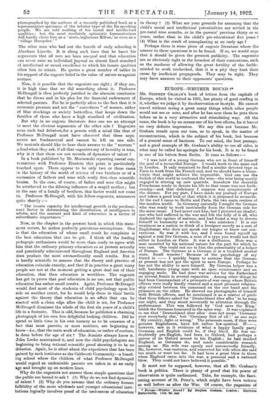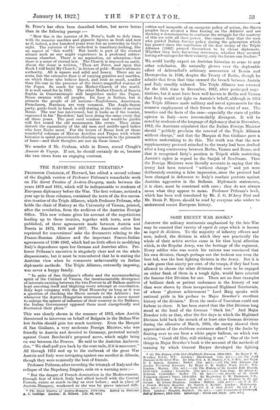EUROPE—WHITHER BOUND ?*
Ma. STEPHEN GRAHAM'S book of letters from the capitals of Europe, which he visited in 1921, has plenty of good reading in it, whether we judge it by its observation or its style. He cannot travel without seeing a great many things which other people would not see or note, and after he has seen them he puts them before us in a very attractive and stimulating way. All the same, the book is by no means one of his best efforts, for it leaves no very definite impression. We say this not because Mr. Graham treads upon our toes, so to speak, in the matter of reconstruction, which is the subject of his book, but because of a general sense of haziness. To our mind, the best passage, and a good example of Mr. Graham's ability to see all sides, is what may be called his apologia for his book. It is to be found in one of his letters from Berlin. It runs as follows :- " I was told of a young German who set in front of himself the goal of a reconciled Europe. I would work to the same end in London. It only remained to find a similar devoted typo in Paris to work from the French end, and we should have a trium- virate that might achieve the impossible. God can use the foolish of this world to confound the wise—the wise being mostly engaged in stirring up new quarrels. Somehow the desirable Frenchman ready to devote his life to that cause was not forth- coming—and that deficiency I suppose was symptomatic of the disease. For my part, I have made my journey of Europe and taken a good look at that which it is proposed to reconcile. At the end I came to Berlin and Paris, the two main centres of the modern world. In Germany naturally I sought the German who was ready to work unstintedly from the German side for the same cause. I had never met him, but I pictured an idealist, one who had suffered in the war and felt the folly of it all, who deplored the egoism of nations, and had found a way to devote himself to humanity as a whole. I was mistaken ! It is our weakness as a nation to think of a foreigner merely as a sort of Englishman who does not speak our tongue or know our con- ventions. So was it with me, and I soon found myself up against a real live German, a man of a type you would not find either in London or Paris. It was a disillusion. Here was a man unsuited by his national nature for the part for which he was cast. One could not see in him the potentiality of a helper of Europe. The German as a German is in a troubled mental state. Small wonder ! Because of the psychology of my friend in — I quickly began to surmise that the German at present has not got the spirit to save Europe. Perhaps he has not the ability to save himself. My German helper was a tall, handsome young man with an open countenance and an engaging smile. He had done war-service for the Fatherland on several fronts in several capacities. Among other things ho had been Commandant of a prisoners-of-war camp where British officers were really kindly treated and a most pleasant relation- ship existed between the command on the one hand and the prisoners on the other. He showed me photographs of himself with British officers, and he mentioned it as a matter of pride that these fellows asked for Deutschland fiber alles ' to be sung one night, and they stood reverently to attention through the performance. This was followed by God save the King.' which the Germans honoured in the same way. It was explained to me that Deutschland fiber alles ' does not mean Germany over everybody else,' but ' Germany first of all ! ' as one says My country, right or wrong.' The prisoners must, if they were genuine Englishmen, have felt rather low-spirited. W—, however, saw in it evidence of what a happy family party Germans and English could be, if they liked. He was un- doubtedly pro-English, had been to Oxford, had perhaps a quiver of an Oxford accent in his English ; he had studied England, as Germans do, and made considerable research among us. His wife was openly and unreservedly friendly. He, however, was cautious, and corrected his wife when she said too much or went too far. It had been a great blow to them when England came into the war, a personal and a national blow. They could not have believed it possible." -
It must not be supposed, however, that all Mr. Graham's book is politics. There is plenty of proof that his power of observation is quite undimmed. Take, for example, the fasci- nating account of St. Peter's, which might have been written as well before as after the War. Of course, the paganism of
• Europe—Whither Bound f By Stephen Graham. London : Thornton Butterworth. 1105. Bd. net
R. Peter's has often been described before, but never better than in the following passage :-
" How fine is the interior of St. Peter's, built to defy time, with its massive marbles and gigantic figures as fresh and new as if, indeed, a few hundred years were but as yesterday in God's sight. The exterior of the cathedral is transitory-looking, like an aspect of ' this world.' But inside is part of the eternal silence such as one might experience in a profound subter- ranean chamber. There is no aspiration, no adoration—but there is a sense of eternal law. The Church is imposed on earth. About the domo is written, ' Thou art Peter, and upon this Rock I will build My Church,' in letters of gold—Rome's ultimate authority. All is square and solid and heavy. There are no seats, but the extensive floor is of varying granites and marbles, on which those who believe kneel, and look so small, smaller than life-size in the presence of the thrice-magnified statues of the Popes. So much for one Mother-Church of the world. It is well cared for in 1921. The other Mother-Church of Sancta Sophia in Constantinople still languishes under the Pagan. Rome swarms with alt peoples. Its base is Italian, but it attracts the people of all nations—Englishmen, Americans, Frenchmen, Russians, are very common. The Anglo-Saxon party, guide-book in hand, is still staring at the ruins of ancient Rome. The war has intervened, but it looks as if the tourist, engrossed in his ' Baedeker,' had been doing the same every day all these years. The post card vendors and would-be guides still fret round the old monuments like crows. They alone disturb the equanimity of the old men and middle-aged ladies who love Homo most. For the lovers of Rome look at those wonderful columns of Marcus Aurelius and Trajan with whole histories in spiral processionals climbing upwards to the pinnacle of fame—and their thoughts are not on these times."
We wonder if Mr. Graham, while in Rome, reread Clough's Amours de Voyage. If not, he should certainly do so, because the two views form an engaging contrast.



































 Previous page
Previous page